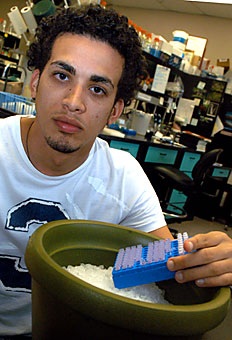 |
|
KEVIN B. KLAUS/Arizona Summer Wildcat
|
Biology senior Edwin Morales studies the link between the plant arabidopsis thaliama and the skin disease called psoriasis as part of the University of Arizona's Undergraduate Summer Research Program.
|
|
|
By Nathan Tafoya
Arizona Daily Wildcat
Wednesday, August 4, 2004
Print this
The tie between the plant, arabidopsis thaliama, and a skin disease called psoriasis may not be clear to some people, but Edwin Morales is connecting the dots and slowly, possibly, creating a picture of health for his mother in Puerto Rico.
Morales, a biology senior visiting from the University of Puerto Rico Cayey, is one of about 100 graduate school-bound juniors and seniors from across the United States and Puerto Rico participating in the University of Arizona's Undergraduate Summer Research Program.
"Low income students usually need to work during the summer to make enough money to go to school," said doctor Maria Teresa Velez, director of the National Institute of Health's Minority Health Disparities Summer Research Program. "But they work in jobs totally unrelated to what they are studying."
The Undergraduate Summer Research Program is a 10-week research program providing both funds and research experience to students seeking to go to graduate school. Areas of research include the sciences, social sciences, arts and humanities.
Last Friday afternoon, Morales leaned over a scientific notebook with headphones over his ears, neatly entering and organizing data with a black pen. He was listening to George Lopez.
"Right now, I'm just basically looking for a gene in arabidopsis thaliama - that's the plant I'm working with - and I'm looking for a mutated gene that inhibits the plant to grow normally so it makes it like a dwarf," said Morales.
The gene he is trying to isolate, Bri1-9, can also be found in rice, tomatoes and peas, according to Morales.
The purpose of making a plant grow smaller is that dwarfing it could lead to the plant being stronger and more survival-fit. Larger plants have thin, narrow stems that can be broken in strong winds, killing the plant.
"If we find it (Bri1-9), it can be used for large production or growing of rice plants maybe," said Morales.
But it is not the survival of rice that drove Morales to make his first trip to America, excluding a previous vacation.
"My mom has a skin disease and this skin disease is known to be genetic, so I want to study genetics and just study the disease at a genetic level," Morales explained. "That's my motivation."
Morales said the main thing for him is to get to graduate school and perform genetic research; he does not want to go to medical school or detour into any other field. He only wants to research.
According to Morales, skin diseases like psoriasis are not studied very much because many researchers are focusing on deadly diseases like cancer.
"My mom's skin's disease won't kill her," Morales said. "But at the same time, it's a very painful physically and psychologically because it has many layers of skin all over the joints, and it hurts."
Morales, who has had to carry his mom around the house because she couldn't stand, said he decided in the eighth or ninth grade that he was going to do something about the disease hurting his mom.
He added that if he cannot find a cure for the genetic disease, maybe he will be able to prevent if from infecting his future children.
"She's my mom," Morales said simply. "She raised me. I had no father figure at all, so she's my everything. That's why I'm studying what I'm studying."
Morales said the summer program, working in a laboratory at a professional level, has solidified his position on being a future researcher.
He said he had to get used to being in a lab and did not know exactly what was happening initially.
"At first it's difficult because it's kind of boring, but then after you start finding stuff and start realizing that you're doing something, then it gets exciting," said Morales.
"He's been doing real well since he's been here," said Morales' lab manager, Michael Wierzba. "Considering that it's relatively a short length of time to do a summer program like this in order to accomplish a lot of things, getting started in a lab and adjusting to what that lab works on."
Wierzba said the only drawback is that Morales will not be able to see his research to completion.
"If I had a semester to find the gene we're looking for I won't be able to do it because I've only got one week left," said Morales. "We think the gene we're looking for is in chromosome five."
Morales and other summer participants will exhibit their research at the Fourth Annual Undergraduate Summer Research Program Poster Session on Aug. 10, from 1 p.m. to 3 p.m. in the South Ballroom of the Student Union Memorial Center.
A closing ceremony will follow at 3 p.m.
Morales will take more than research experience back to Puerto Rico, including an introduction to comedian George Lopez and exposure to what is known as "a dry heat."
"You have 4 percent humidity here," Morales said, noting some of the larger differences between Tucson and his country. "Puerto Rico is like 85 percent all year long."
Morales also discovered Mexican food while he was here.
"I like it," he said. "I don't like it that spicy as Mexicans do. I have a Mexican friend and everything he eats, he puts spicy sauce on. Everything, even eggs. And I'm like, 'Oh no.' I couldn't do that."

